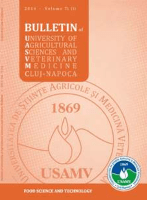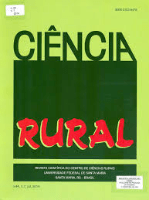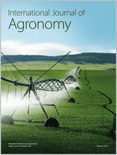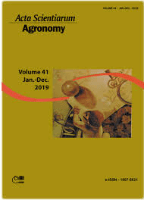
Journal of Agricultural Science and Technology
Scope & Guideline
Unveiling the Future of Agriculture through Research
Introduction
Aims and Scopes
- Crop Science and Agronomy:
Research on crop production techniques, including irrigation, fertilization, and pest management, to enhance yield and quality while ensuring sustainability. - Soil and Water Management:
Studies focusing on soil health, water use efficiency, and the impact of agricultural practices on soil and water resources. - Plant Genetics and Breeding:
Exploration of genetic diversity, breeding techniques, and biotechnological applications to improve crop resistance and productivity. - Post-Harvest Technology:
Innovations in post-harvest handling, storage, and processing to maintain quality and extend the shelf life of agricultural products. - Agroecology and Sustainable Practices:
Research promoting sustainable agricultural practices, including organic farming, agroecological approaches, and resource conservation. - Food Safety and Quality:
Assessment of food safety, nutritional quality, and the impact of agricultural practices on food products. - Agricultural Economics and Policy:
Analysis of economic factors affecting agriculture, including market dynamics, policy implications, and the socio-economic impact of agricultural practices.
Trending and Emerging
- Sustainable Agricultural Practices:
An increasing number of studies are exploring sustainable farming techniques, including organic farming, agroecology, and conservation agriculture to promote environmental sustainability. - Innovative Biotechnology Applications:
Research focused on biotechnological advancements, such as CRISPR and gene editing, is gaining momentum, particularly in developing resistant crop varieties. - Climate Change Adaptation Strategies:
Emerging research is concentrating on adapting agricultural practices to mitigate the impacts of climate change, focusing on resilience and resource management. - Precision Agriculture Technologies:
The adoption of precision agriculture, including the use of drones, IoT, and data analytics, is increasingly featured, reflecting a trend towards optimizing resource use. - Food Security and Nutrition:
There is a growing emphasis on food security, nutrition, and the role of agriculture in addressing global food challenges, particularly in developing regions. - Waste Utilization and Circular Economy in Agriculture:
Research on utilizing agricultural waste and promoting a circular economy is trending, highlighting the importance of sustainability in agricultural systems.
Declining or Waning
- Traditional Pest Control Methods:
Research on conventional pesticide use is decreasing as there is a shift towards integrated pest management and biological control alternatives. - General Agricultural Extension Approaches:
Focus on traditional agricultural extension methods is waning in favor of innovative, technology-driven approaches that engage farmers more effectively. - Single Crop Production Systems:
Interest in monoculture practices is declining as more studies emphasize the benefits of crop diversification and intercropping for sustainability. - Chemical Fertilizers:
There is a noticeable decline in research focused solely on chemical fertilizers as the agricultural community moves towards organic and sustainable fertilization practices. - Livestock Production without Sustainable Practices:
Research on conventional livestock production methods is decreasing, reflecting a growing interest in sustainable and ethical practices.
Similar Journals

Bulletin of University of Agricultural Sciences and Veterinary Medicine Cluj-Napoca-Food Science and Technology
Bridging Academia and Industry in Food TechnologyBulletin of University of Agricultural Sciences and Veterinary Medicine Cluj-Napoca - Food Science and Technology is a prominent peer-reviewed journal dedicated to advancing the field of food science and technology. Published by the University of Agricultural Sciences and Veterinary Medicine Cluj-Napoca, this open-access journal has been serving the academic community since 2013, promoting the dissemination of high-quality research that addresses pressing issues in food safety, quality, and innovation. With its ISSN 2344-2344 and E-ISSN 2344-5300, the journal aims to bridge the gap between academia and industry by providing a platform for scholars and practitioners to share their findings, insights, and methodologies. Situated in the heart of Romania, the journal reflects the country's rich agricultural heritage and its commitment to enhancing global food systems. By maintaining a rigorous editorial standard, the Bulletin ensures that it remains a vital resource for researchers, industry professionals, and students who are keen to explore the latest developments in food science.

ACS Agricultural Science & Technology
Exploring the Future of Agriculture Through Cutting-edge ResearchACS Agricultural Science & Technology, published by the American Chemical Society, is an influential journal dedicated to the advancement of agricultural research and technologies. Since its convergence in 2021 and continuous publication until 2024, the journal has established itself in the fields of Agricultural and Biological Sciences, Agronomy and Crop Science, Food Science, and Plant Science, having achieved a commendable Q2 ranking across these categories in 2023. This signifies its growing impact and relevance within the global research community, evidenced by its Scopus rankings, which place it in the top percentiles of its fields. Although currently not an open-access journal, it provides a critical platform for disseminating pioneering research that addresses pressing agricultural challenges, fostering innovation in crop production, food security, and sustainable practices. As such, it serves as an essential resource for researchers, professionals, and students aiming to contribute to the future of agricultural science.

CIENCIA RURAL
Empowering research in agronomy, animal science, and beyond.CIENCIA RURAL, published by the Universidade Federal de Santa Maria in Brazil, is a prominent open-access journal since 1995, dedicated to advancing research in the fields of Agronomy and Crop Science, Animal Science and Zoology, and Veterinary Science. With an ISSN of 0103-8478 and an E-ISSN of 1678-4596, this journal offers a platform for scientists, professionals, and students to disseminate their findings and engage in scholarly discussion. Classified in the Q3 quartile across multiple categories for 2023, CIENCIA RURAL holds competitive rankings in Scopus, standing at rank #89/194 in General Veterinary and #250/406 in Agronomy. The journal’s objective is to bridge gaps in research and foster innovative solutions to agricultural and biological challenges. With an open-access model, it ensures that all published content is freely available, thus supporting a global exchange of knowledge and ideas. For anyone committed to enhancing the agricultural sciences, CIENCIA RURAL serves as an invaluable resource and community hub.

POTATO RESEARCH
Pioneering breakthroughs in potato science.POTATO RESEARCH is a prestigious journal dedicated to advancing the scientific understanding of potato cultivation and its wider implications in the fields of agronomy, crop science, and food science. Published by Springer in the Netherlands, this journal boasts an impressive impact factor and ranks in the Q2 category for both Agronomy and Crop Science, as well as Food Science in 2023, affirming its significant contribution to these disciplines. With over five decades of research converged from 1970 to 2024, POTATO RESEARCH serves as a vital platform for researchers, professionals, and students interested in the latest findings and innovations that affect potato production and processing. Although it is not an open-access journal, it remains a crucial resource for those dedicated to enhancing agricultural sustainability and food security. For inquiries or submission details, please refer to their office located at Van Godewijckstraat 30, 3311 GZ Dordrecht, Netherlands.

AGRONOMIA MESOAMERICANA
Fostering collaboration in the heart of Mesoamerica's agriculture.AGRONOMIA MESOAMERICANA is a distinguished open-access journal published by UNIV COSTA RICA, dedicated to advancing knowledge in the fields of agronomy, crop science, food science, and soil science. Since its inception in 1990, the journal has provided a platform for researchers and professionals to disseminate their findings, contributing significantly to the agricultural sciences. With an E-ISSN of 2215-3608, it operates from Costa Rica, specifically from the Centro Investigaciones Agronómicas, situated in San José. Despite its current classification in the Q4 quartile for 2023 in the respective fields, it aims to stimulate academic discourse and inspire innovative solutions to pressing agricultural challenges. The journal attracts a diverse audience and encourages submissions that focus on sustainable practices, food security, and environmental stewardship, making it an essential resource for researchers, professionals, and students alike seeking to enrich their understanding and share crucial insights in the agronomy landscape. Open access ensures that all published research is freely available, fostering collaboration and knowledge exchange worldwide.

International Journal of Agronomy
Leading the Way in Agricultural Research ExcellenceIntroducing the International Journal of Agronomy, an influential publication in the field of agricultural sciences, established by HINDAWI LTD. With an impact factor that reflects its relevance and quality, this journal has been an essential resource for researchers and professionals since its shift to Open Access in 2009, facilitating widespread dissemination of knowledge. Based in the United States, the journal has achieved notable recognition within the academic community, currently ranked in the Q2 quartile among Agronomy and Crop Science, with an impressive Scopus Rank of #139 out of 406 in its category, representing the top 65th percentile. Spanning from 2013 to 2024, it aims to advance the understanding and innovation in agronomy through its rigorous peer-reviewed research articles, reviews, and case studies. With a commitment to enhancing global agricultural practices and sustainability, the International Journal of Agronomy stands as a vital platform for sharing cutting-edge findings that ultimately contribute to the advancement of the agronomic sciences.

Revista de Ciencias Agricolas
Exploring New Frontiers in Agricultural ResearchRevista de Ciencias Agricolas, published by UNIV NARINO, is a prominent open-access journal dedicated to advancing the field of agricultural sciences. Since its inception in 1969, this journal has been an invaluable resource for researchers, professionals, and students alike, focusing on a wide array of topics that include sustainable farming practices, agricultural technology, and rural development. With the ISSN 0120-0135 and the E-ISSN 2256-2273, the Revista de Ciencias Agricolas ensures broad accessibility to its research articles, facilitating a wider dissemination of knowledge within the agricultural community. Situated in San Juan Pasto, Nariño, Colombia, the journal is committed to providing high-quality content that addresses both local and global agricultural challenges, thereby contributing to the enhancement of food security and livelihoods across diverse populations. The journal's inclusive approach not only fosters academic discourse but also encourages innovative solutions within the agricultural sector, making it an essential platform for knowledge exchange in this vital area of study.

ACTA SCIENTIARUM-AGRONOMY
Advancing agricultural knowledge for a sustainable future.ACTA SCIENTIARUM-AGRONOMY is a prestigious, peer-reviewed journal published by UNIV ESTADUAL MARINGA, PRO-REITORIA PESQUISA POS-GRADUACAO, focusing on advanced research in the field of agronomy and crop science. Since its inception as an Open Access journal in 2007, it has significantly contributed to disseminating high-quality research, allowing unrestricted access to its content for a global audience. Operating from Brazil, the journal holds a notable Q2 category ranking in Agronomy and Crop Science as of 2023, validating its importance within the academic community. The journal’s Scopus ranking positions it in the 49th percentile among Agricultural and Biological Sciences, indicating a robust foundation for impactful research. With a commitment to innovation and scientific excellence, ACTA SCIENTIARUM-AGRONOMY aims to provide researchers, professionals, and students with vital insights that drive forward our understanding of agriculture and its environmental implications.

PAKISTAN JOURNAL OF AGRICULTURAL SCIENCES
Exploring Agricultural Frontiers for a Sustainable FutureWelcome to the Pakistan Journal of Agricultural Sciences, a prominent platform for disseminating vital research findings in the fields of agronomy, crop science, food science, plant science, and soil science. Published by the prestigious University of Agriculture in Faisalabad, this journal aims to enhance the scientific discourse surrounding agricultural innovation and sustainability in Pakistan and beyond. With an ISSN of 0552-9034 and E-ISSN of 2076-0906, the journal serves as a valuable resource for researchers, professionals, and students interested in cutting-edge agricultural developments. As of 2023, the journal is ranked in the Q3 category for Agronomy and Crop Science as well as Food Science and positioned in Q4 for Plant and Soil Science, highlighting its growing impact within a competitive academic landscape. While the Pakistan Journal of Agricultural Sciences is not currently open access, it provides a comprehensive archive of research converging from 2011 to 2024, ensuring that critical knowledge remains accessible to those striving to advance the agricultural sciences. Join us in our mission to foster innovation and support sustainable practices in agriculture.

Journal of Agricultural Sciences-Tarim Bilimleri Dergisi
Pioneering Research for the Future of FarmingJournal of Agricultural Sciences - Tarim Bilimleri Dergisi, published by Ankara University, Faculty of Agriculture, is a prominent open-access journal that has been fostering academic dialogue in the field of agricultural studies since 2010. With ISSN 1300-7580 and E-ISSN 2148-9297, this journal contributes significantly to the scientific community, particularly within the realms of agronomy, crop science, animal science, and plant science. As of 2023, it holds a Q3 classification in Agronomy and Crop Science, and Q4 in both Animal Science and Zoology and Plant Science, indicating its growing influence and dedication to advancing research in these areas. Situated in Turkey, this journal serves as a vital platform for scholars, professionals, and students, inviting submissions that enhance our understanding of agricultural innovation and sustainability. With a commitment to disseminating high-quality research, Journal of Agricultural Sciences ranks favorably within Scopus, providing an invaluable resource for exploring evolving agricultural paradigms.